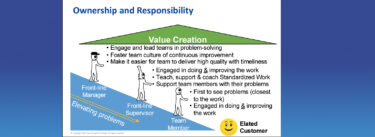I recently got a call from an old friend who led one of the first lean implementation efforts in healthcare in the mid-1990s. He has moved on to other challenges and we hadn’t had a chance to catch up in recent years. So I asked him what happened to the lean initiative in the healthcare organization where he had been a senior manager.
The answer was what I feared. “We created a lean improvement team and conducted a comprehensive campaign to kaizen the organization’s key value streams. And we had dramatic results. Faster patient flows. Better outcomes. Lower costs. But we couldn’t sustain the gains. The improvement efforts weren’t connected to the way the organization was managed and the value streams started to regress to the mean as soon as the improvement team left. After I left the organization, the whole program came to an end. What a shame.”
My friend is far from alone. In our annual LEI web survey of the Lean Community, a leading problem Lean Thinkers always note about their improvement efforts is “backsliding to old ways of working” after initial progress. And the most frequently cited issue this year is “middle management resistance” to change. In short, the lean movement has a sustainability issue we now need to address.
What is at the heart of our sustainability problem? More important, what can we do about it?
I believe that the root cause of regression in most organizations today is confusion about priorities at different levels of the organization compounded by the failure to make anyone responsible for the performance of important value streams as they flow horizontally across the enterprise.
To prevent regression, someone needs to periodically clarify priorities for each value stream and identify the performance gap between what the customer needs and what the value stream is providing. The person taking responsibility then needs to engage everyone touching the value stream in carefully capturing the current condition (the “current state”) of the value stream which is causing the gap. The next step is to envision a better value stream and determine who will need to do what by when to bring it into being. Finally, the value stream leader needs to determine what will constitute evidence that the performance gap has been closed and collect the data to demonstrate this. This exercise is, of course, nothing but Dr. Deming’s Plan-Do-Check-Act cycle conducted repetitively by the responsible person, ideally employing A3 analysis.
I’m not proposing a dramatic change in the organization chart to reassign authority. Indeed, I’ve hardly ever seen an organization improved by a “re-organization”. And I’m not suggesting the creation of a matrix organization where everyone has a vertical and a horizontal boss. Rather, during the transition to a mature lean organization, someone with another job in the organization needs to take on the role of periodically (and quickly) auditing the horizontal flow of value and bringing to the attention of everyone touching the stream how the organization is performing along that stream.
Note that periodic audits of processes within small areas (for example, a continuous-flow work cell or a materials replenishment process) are a well established aspect of Toyota practices that I call “standard management”. So auditing across departments and functions to examine value stream from end to end is a scaling up of current best practice, not something wholly new.
Auditing every value stream will expose problems with the flow of value and contradictions in organizational objectives. Indeed, it will expose many problems and many contradictions. And that is precisely the point. Most value streams currently have substantial performance gaps, but the magnitude of the gap and the precise causes are hard for anyone to see. (Hence the confusion and resistance of many middle managers, who are doing well on one set of objectives – asset utilization, for example — when lean methods require another set.) And fixing the root causes of poor performance will require someone – and quite possibly everyone — touching the stream to change their behavior.
It follows that the responsible manager needs to engage in a dialogue with the leaders of the functions and, if necessary, with top level management to gain agreement on who must do what by when to achieve a sustainable leap in performance that will benefit the customer and the organization. (One of the “whats” is likely to be rethinking the metrics the “change resisting” middle managers are being judged on.) The responsible person then must periodically revisit the value stream, not just to prevent regression but to continually move it to a higher level of performance.
A special problem as we tackle this issue is that we can’t simply copy current-day Toyota. In the past Toyota went through many iterations of how to solve the problem of value stream management across the organization. But today its mature organization relies on policy management (hoshin kanri) at the macro level and a cadre of line managers auditing their areas at the micro level. Because there is no confusion about objectives from top to bottom and because managers have been taught from the very beginning of their careers how to see the flow of value under their management, no formally appointed value stream managers are needed.
Other organizations – yours and mine for example! – are different and what we need now are experiments with value stream management methods. Whatever the final answer, everyone in the Lean Community has a big stake in our solving the sustainability problem. Otherwise, the current surge of interest in lean — driven by the success of Toyota — may become just another episode in the long history of unsustainable management improvement campaigns.
Best regards,
Jim
Jim Womack
Chairman and Founder
Lean Enterprise Institute
P.S. I will be tackling the sustainability issue in detail in my presentation to the first Global Lean Healthcare Summit in the United Kingdom June 25 and 26. I hope I will see many lean thinkers there who are ready to tackle this issue with me.






